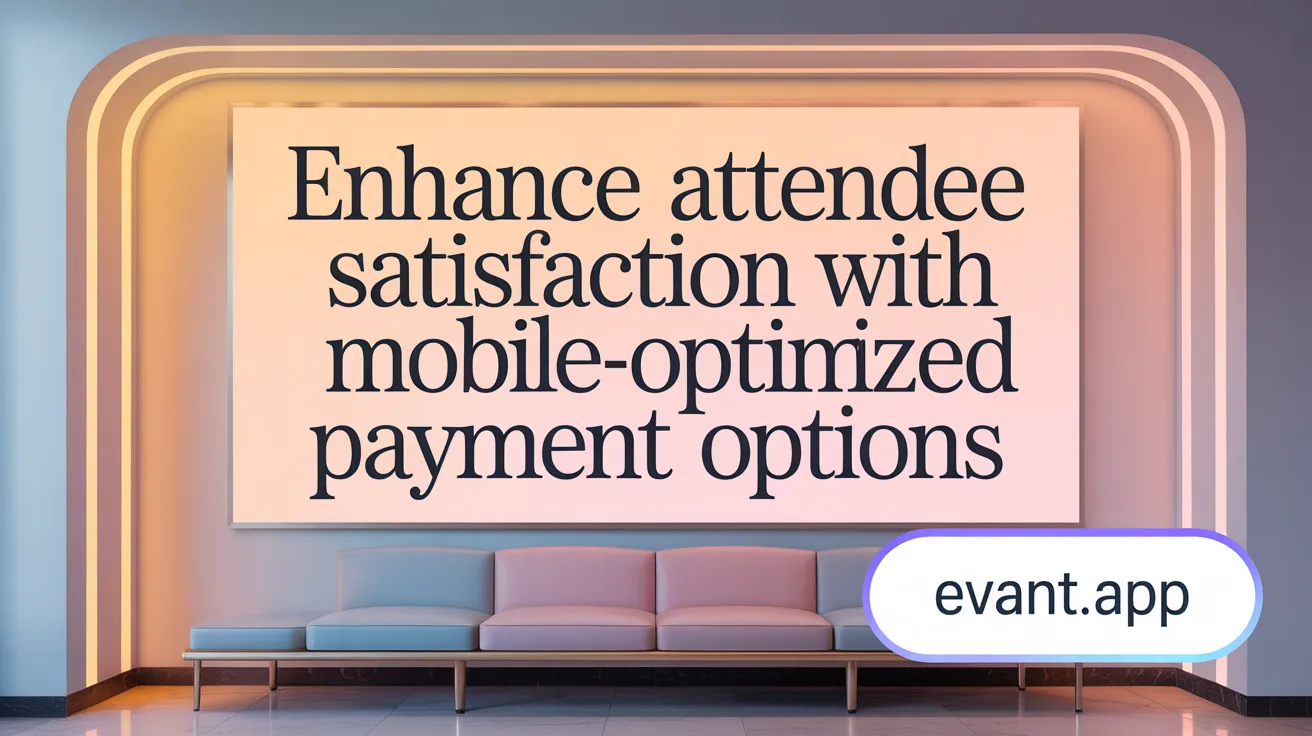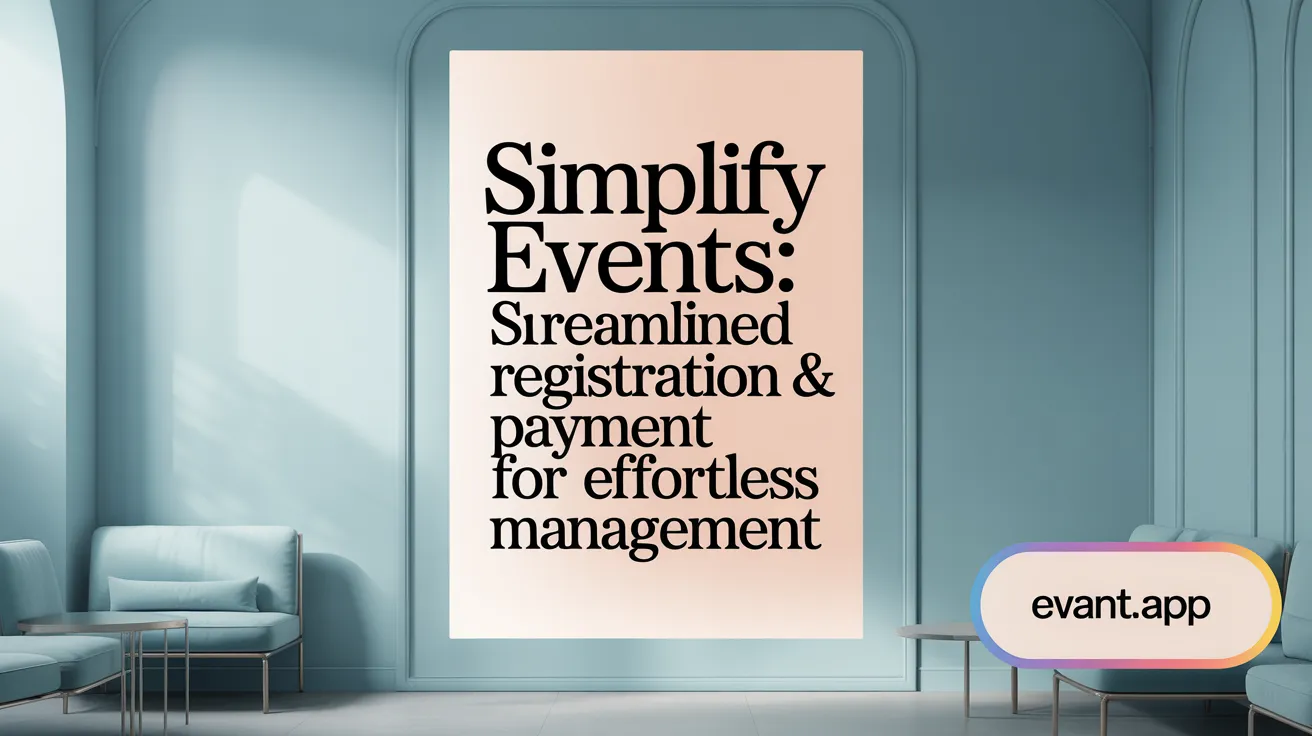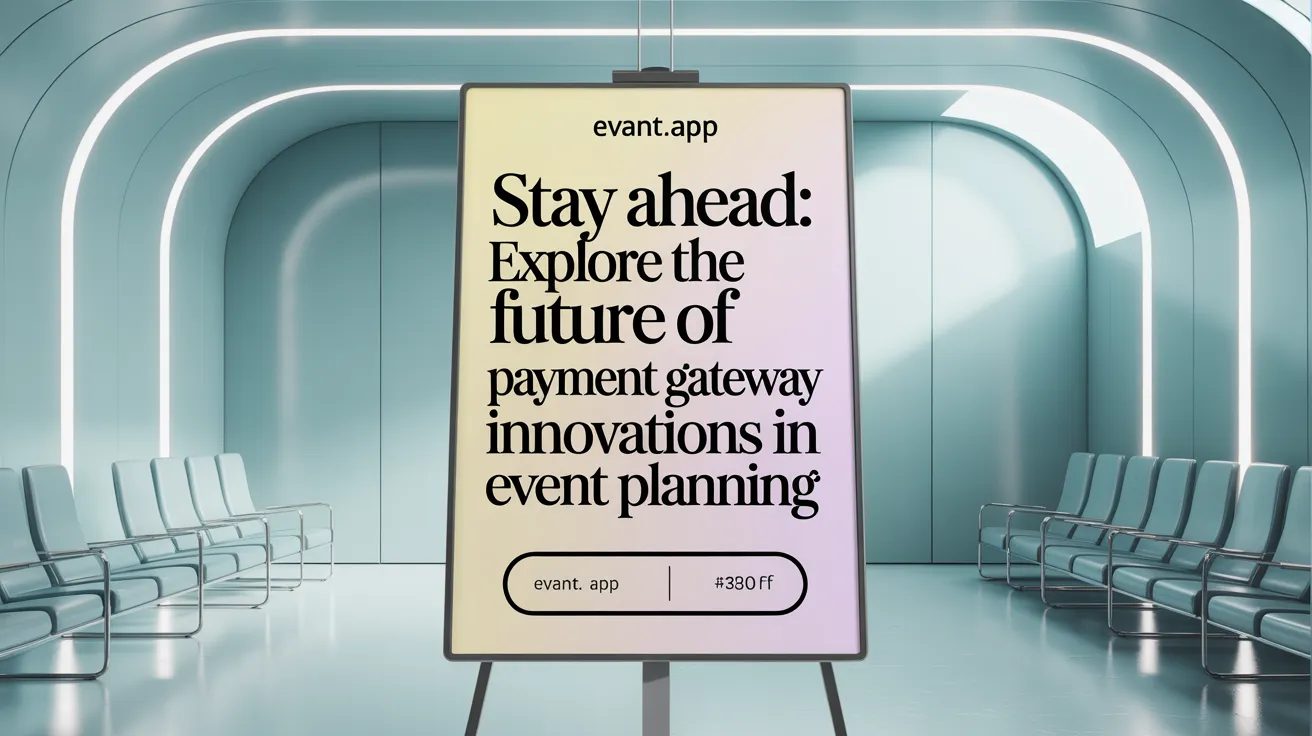Integrating Payment Gateways with RSVP Platforms: Best Practices

Introduction to Integrating Payment Gateways with RSVP Platforms
Enhancing Event Management Through Payment Gateway Integration
Integrating payment gateways with RSVP platforms has become essential for modern event management. It streamlines the registration process by securely facilitating online payments for tickets, donations, or fees directly through the RSVP system.
For event organizers, this integration offers numerous benefits including faster payment processing, real-time tracking of transactions, and automated financial reporting. These features significantly reduce manual administrative work and allow for smoother management of refunds and payment reconciliations.
Attendees benefit from a seamless and convenient payment experience with multiple payment options such as credit cards, digital wallets, and online banking. This flexibility encourages higher participation rates and a better overall user experience.
In nonprofit and educational sectors, integrating payment gateways supports efficient fundraising and registration efforts. Platforms like Stripe and PayPal are widely used due to their security compliance and ease of recurring payments, which are vital for sustaining nonprofit initiatives and educational events.
Overall, integrating payment gateways with RSVP platforms enhances operational efficiency, boosts attendee engagement, and supports secure, compliant transactions necessary for successful event management.
Key Benefits of Payment Gateway Integration in RSVP Systems
What are the advantages of integrating payment gateways with RSVP platforms?
Integrating payment gateways with RSVP platforms brings multiple advantages that enhance both the organizer's efficiency and the attendee's experience.
Firstly, providing multiple payment options for events such as credit cards, digital wallets, and online banking significantly increases convenience for attendees. This variety not only meets diverse payment preferences but also boosts registration and ticket sales by reducing barriers to payment.
Secondly, automated payment tracking and reporting simplify financial oversight. Organizers can monitor payment statuses in real-time, access detailed financial reports, and reconcile transactions automatically. This automation reduces administrative workloads and minimizes errors, allowing event teams to focus on delivering excellent experiences.
Thirdly, integrated tools offer financial management with payment gateway integration by analyzing revenue streams, identifying payment trends, and optimizing budgeting and forecasting for future events. These insights empower better decision-making and more strategic planning.
Lastly, integrating payment gateways streamlines refund processing through payment systems, enabling event organizers to initiate refunds directly through the RSVP platform. This seamless process enhances attendee trust and satisfaction, while simplifying financial operations.
In summary, payment gateway integration within RSVP systems not only modernizes payment handling but also builds confidence, improves cash flow management, and strengthens overall event operations.
Ensuring Security and Compliance in Payment Gateway Integration
How can event organizers ensure secure transactions when integrating payment gateways?
Event organizers must prioritize security and compliance to protect attendee payment data and build trust. Selecting payment gateways that strictly follow Payment Card Industry Data Security Standard (PCI DSS) compliance is essential. PCI DSS sets rigorous requirements including encryption, firewall configurations, access controls, and regular security testing to secure cardholder information.
Secure data encryption ensures transaction details are unreadable during transmission, while tokenization replaces sensitive data with anonymous tokens to minimize risk exposure. Additionally, features like two-factor authentication for payments add extra layers of protection against unauthorized access.
Advanced fraud detection systems are now leveraging machine learning algorithms that analyze transaction patterns in real-time. For instance, Stripe Radar fraud prevention uses artificial intelligence to identify and prevent fraudulent transactions, significantly reducing losses and chargebacks.
Integrating these secure event payment transactions and payment gateway security features not only safeguards sensitive attendee data but also enhances attendee confidence in the registration and payment process. Organizers benefit from reduced fraud risk and compliance with global security standards, essential for hosting smooth and credible events.
Choosing the Right Payment Gateways for RSVP Integration

What factors should be considered when selecting payment gateways to integrate with RSVP platforms?
Selecting an ideal payment gateway for RSVP integration involves multiple important considerations to ensure smooth transactions and a positive attendee experience.
Compatibility is fundamental; the gateway must seamlessly work with the RSVP software and event management tools being used, avoiding technical disruptions. Security features are crucial—look for gateways that offer data encryption, Payment Card Industry Data Security Standard (PCI DSS) compliance, fraud detection, and user authentication to protect sensitive payment information.
Scalability is also key. The gateway should handle large volumes of payments reliably, especially for events with thousands of attendees or high demand. Supporting multiple currencies and payment methods—such as credit cards, digital wallets, and mobile payments—broadens accessibility for international audiences and diverse payment preferences.
Popular payment gateways like Stripe integration, PayPal integration, and Authorize.Net have proven their reliability and offer extensive features including recurring payments, refunds, and real-time reporting. These platforms also tend to have strong customer support and flexible integration options.
Transaction fees vary among providers and can impact non-profit or budget-conscious events, so understanding cost structures is important. Access to responsive, knowledgeable customer support ensures prompt resolution of payment issues, helping maintain event professionalism and trust.
Overall, the right payment gateway balances technical compatibility, robust security, broad payment options, cost-effectiveness, and dependable support, creating a reliable and user-friendly payment experience within RSVP systems. For additional insights into choosing payment gateways for events and understanding payment provider integration, refer to these comprehensive resources.
Optimizing the User Experience through Payment Gateway Integration

How does integrating payment gateways improve the attendee payment experience?
Integrating multiple payment gateways into event platforms significantly enhances the attendee payment experience by offering diverse and flexible payment options. Attendees can use familiar methods like credit and debit cards, as well as popular digital wallets such as Apple Pay and Google Pay. Incorporating buy-now-pay-later (BNPL) services further broadens payment preferences, reducing purchase hesitation and boosting registration conversions.
Providing diverse payment options including credit cards, digital wallets, and BNPL
Offering a wide range of payment methods meets the varied preferences of attendees. This diversity not only simplifies the payment process but also helps maximize revenue by minimizing obstacles during checkout. Payment gateways support this flexibility seamlessly, allowing attendees to choose their preferred way to pay with ease and confidence.
Mobile payment optimization to reduce abandonment
Since mobile devices account for a large portion of event registration traffic, optimizing payment workflows for mobile is critical. Techniques like compressing images, minimizing page requests, integrating native digital wallets, and simplifying checkout steps contribute to faster load times and lower abandonment rates. Research shows that over half of mobile users abandon slow-loading sites, so mobile optimization directly impacts completion rates.
Embedding payment and calendar integrations in RSVP confirmations
Embedding payment links and 'Add to Calendar' options within RSVP confirmation emails creates a smooth and engaging post-registration experience. This integration allows attendees to easily complete payments if pending and automatically save event dates to their calendars, reducing scheduling conflicts and boosting attendance.
Automated payment reminders and follow-ups
Automated emails reminding attendees of upcoming payments or abandoned transactions serve as effective nudges to finalize registrations. These reminders often include direct payment links or QR codes, speeding up the payment process. Such automation increases cash flow reliability and overall event profitability, as explained in the Event Payment Processing Tips and Best Practices.
By combining these features—diverse payment options, mobile-friendly designs, embedded integrations, and automated reminders—event organizers can substantially improve attendee satisfaction and drive higher registration completion rates.
Streamlining Event Registration and Payment Workflows

How do integrated payment gateways streamline event registration and payment processes?
Integrated payment gateways play a crucial role in simplifying event registration and payment workflows. They automate the transfer of RSVP attendee information directly to payment providers like Stripe integration and PayPal integration. This automation reduces manual data entry, lowers the chance of errors, and speeds up payment processing.
Event platforms equipped with these integrations often support QR code check-ins, allowing for fast and smooth ticket scanning at the event, which enhances the attendee experience.
Moreover, integrated systems unify proposals, contracts, and payments into one cohesive workflow. This consolidation means organizers can send proposals, collect signed contracts, and process deposits or final payments all through the same platform, as described in integrated payments in event management platforms. It dramatically reduces administrative overhead and the risk of lost or delayed payments.
Real-time reporting and analytics tools within these systems provide live updates on registration counts, payment statuses, and revenue tracking, highlighted in automated payment tracking and reporting. Organizers can easily monitor overall event financial health without manual reconciliation, freeing up time to focus on attendee engagement and event success.
Ultimately, integrated payment gateways and event management systems create a seamless, efficient process from registration to payment collection to event check-in, streamlining workflows and elevating the overall management experience, as explained in Event Payment Processing Tips.
Supporting Diverse Event Types and Payment Needs
What payment integration features support different event formats and audience needs?
Modern event management platforms and RSVP plugins are designed to handle a wide spectrum of event formats, including virtual, hybrid, and in-person gatherings. One essential feature is integration with virtual meeting platforms such as Google Meet integration and Zoom integration, which facilitates seamless participation for remote attendees directly through RSVP platforms.
Recurring events and multi-response RSVP capabilities enhance flexibility by allowing guests to register multiple times or update their responses as needed, catering to ongoing or repeating events, as detailed in RSVP plugin features 2025.
Customizable payment plans support various pricing strategies and attendee convenience, such as tiered donations or installment options, highlighted in resources on Flexible Payment Processing and Tiered donation options. Multiple payment methods—including credit/debit cards, mobile wallets, bank transfers, and buy-now-pay-later services—are integrated to boost registration conversions and user satisfaction as described in Event Payment Processing Tips and Multiple Payment Options.
To extend outreach internationally, many systems support multi-currency transactions and local payment options, accommodating global audiences effortlessly, as covered in Multi-Currency Payment Support and Payment Gateway Security Features. This reduces barriers and streamlines payment processing across borders.
Together, these features ensure that event organizers can effectively manage diverse event types while providing an inclusive, user-friendly payment and RSVP experience for all attendees, regardless of location or event nature.
Analytics and Reporting Advantages from Integrated Payment Systems

How does integration of payment gateways enhance analytics and reporting for event organizers?
Integrating payment gateways directly into event management platforms offers significant benefits for analytics and reporting. Organizers gain access to real-time payment tracking dashboards where payment statuses are tracked alongside registration data. This setup enables immediate identification and resolution of pending or failed transactions, ensuring smoother financial workflows.
Automated financial reporting is streamlined through these integrations. Systems automatically compile revenue figures, track refunds, and reconcile transactions without manual intervention, saving time and reducing errors. This efficiency allows organizers to focus more on strategic tasks rather than administrative ones (Automated payment tracking and reporting, Automated payment collection schedules).
Beyond basic reporting, integrated payment systems analyze payment trends and attendee behaviors. These insights are invaluable for optimizing event pricing, tailoring marketing campaigns, and refining fundraising methods. For nonprofits and organizers aiming to boost participation and revenue, such data-driven strategies enhance overall event success (Payment tracking in RSVPify, event management payment integration).
In summary, integrated payment platforms empower event teams with real-time monitoring, automated financial tracking, and actionable insights. This combination not only improves operational efficiency but also informs smarter event planning and fundraising strategies, ultimately elevating attendee experience and organizational outcomes (Financial management tools for events, Integrated Payment Management Systems).
Best Practices for Refunds and Customer Support in Integrated Payment Systems
Simplifying Refund Processes via Integrated Platforms
Integrated payment gateways allow event organizers to initiate and manage refunds directly within the event management software. This capability streamlines the refund workflow, reduces manual administrative effort, and speeds up resolution times. By tracking refund status in real-time, organizers can keep attendees informed and maintain transparency, which builds trust and enhances user satisfaction.
Communicating Clear Refund Policies to Attendees
A clearly communicated refund policy accessible at the time of registration or ticket purchase reduces attendee anxiety and confusion. Providing detailed, easy-to-understand guidelines on the circumstances and process for refunds helps set expectations and establishes a professional tone, which improves trust in the event’s payment system.
Automated Follow-Up Emails for Payment Issues
Automated email reminders serve as gentle nudges to attendees who have late or abandoned payments, increasing the likelihood of completing their registration. These timely follow-ups facilitate revenue recovery and improve cash flow. Including direct payment links or QR codes within reminder emails streamlines the payment process, as seen in automated payment tracking and reporting and automated follow-up emails.
Importance of Responsive Customer Support for Payment-Related Queries
Offering prompt, knowledgeable, and courteous support for payment-related questions or problems is vital. Responsive support teams help resolve attendee concerns quickly, reducing frustration and preventing negative experiences. This responsiveness reassures attendees, fostering ongoing engagement and loyalty, aligning with customer support features.
Implementing these best practices ensures an efficient, transparent, and attendee-friendly payment process, ultimately contributing to smoother event management and better financial outcomes.
Future Trends and Innovations in RSVP and Payment Gateway Integration

What are the future trends shaping payment gateway integration with RSVP platforms?
Payment gateway integration with RSVP systems is evolving quickly, driven by advancements in payment gateway optimization including AI and machine learning. These technologies power smarter fraud detection tools that proactively identify and prevent suspicious transactions, safeguarding attendee data and revenue. Smart routing is another innovation, dynamically selecting the best payment processor to increase transaction approval rates while lowering processing fees.
Integration between RSVP platforms and CRM or fundraising software is becoming deeper and more seamless. This allows event organizers and nonprofits to better manage attendee and donor records, personalize communication, and optimize fundraising campaigns based on comprehensive data. See RSVP plugin features 2025 and payment processing for nonprofits for details on this integration.
The range of supported payment options is broadening beyond traditional credit cards and digital wallets. Emerging alternatives like buy now pay later services and revenue-based financing provide attendees and organizations more flexibility, improving cash flow management and boosting conversions. Also review multiple payment options for events and flexible payment processing resources.
Continuous optimization is vital in this fast-paced landscape. Monitoring key performance indicators (KPIs) such as payment success rates, abandonment rates, and fraud incidents through advanced payment analytics for event management enables organizers to fine-tune their payment processes continuously. This proactive approach enhances user experience, maximizes revenue, and streamlines event management workflows. Additional best practices can be found in Event Payment Processing Tips and integrated payments in event management.
Together, these future trends promise more secure, flexible, and efficient payment experiences integrated tightly with RSVP and event management tools, driving success for nonprofits and event professionals alike. For comprehensive event payment ecosystem insights, see Integrating multiple payment gateways and Event payment processing.
Conclusion: Maximizing Event Success with Integrated Payment Gateways
Streamlining Event Payments Enhances Success
Integrating multiple reliable payment gateways like Stripe, PayPal, and Authorize.Net provides event organizers with a seamless, secure way to handle registrations, donations, and ticket sales. This flexibility boosts attendee convenience through diverse payment options including credit cards, digital wallets, and local payment methods.
Security and Compliance Are Essential
Securing transactions with encryption, PCI DSS compliance, and fraud detection protects sensitive data and builds attendee trust. Features like automated payment tracking and real-time reporting reduce administrative burden and enable efficient financial management.
Best Practices Foster Growth for Nonprofits and Educators
Adopting integrated payment solutions helps nonprofits and educational organizations streamline fundraising and event operations. Automated reminders, customizable payment plans, and simplified refund processing improve user experience and increase participation. Furthermore, syncing payment data with CRM and event management platforms enables targeted communication and better resource allocation.
By embracing these best practices, organizations can enhance participant engagement, optimize revenue flows, and elevate overall event success.
Related Blogs


How Community Churches Should Leverage SMS to Boost Engagement
Michael PedoeemStruggling with low church attendance? Discover how to leverage SMS to reach 98% of your congregation instantly and review the top 5 church communication platforms.


SMS for Churches: A Guide to Better Engagement
Michael PedoeemLearn how SMS for churches can boost engagement, improve communication, and streamline event management. Discover best practices for church texting today.
Ready to transform your community









